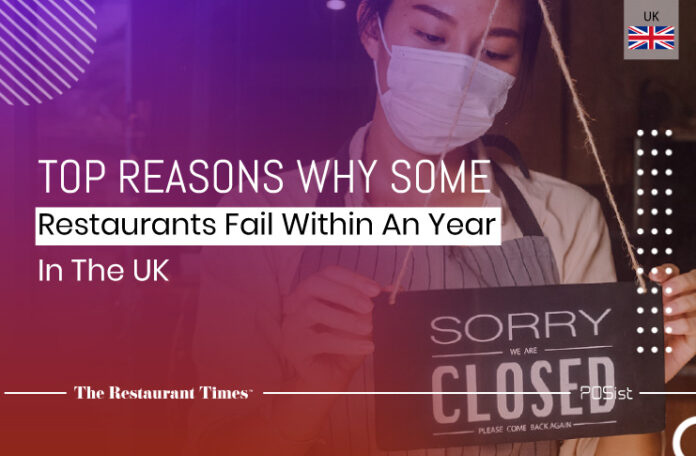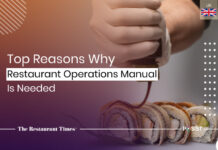The restaurant industry is dynamic and running a successful restaurant is not an easy task. Every day hundreds of restaurants open and every day many close down. Over the last few years, multiple good restaurants have closed in the first year of inception. In 2020, 50% of limited-service restaurants became distressed businesses due to changes in consumer behaviour brought about by the COVID-19 pandemic. But why do restaurants fail? One of the major reasons is low profitability. Some other reasons attributed to this are:
- high staff cost
- high rental cost
- high cost of employees
- low customer inflow
- high managing cost. According to data, nearly 60% of new restaurants fail within the first year and 80% of them close down before the fifth year.
While running a restaurant business sounds ambitious, it’s important to plan your restaurant’s to generate traction, get customers and build your name in the hospitality industry. Below are a few reasons why restaurants fail within the first year of opening.
11 Reasons Why Restaurants Fail
There are several reasons why a restaurant fails in its first year of inception. Let’s look at the most common reasons.
1. Poor Inventory Management
A very important reason which cannot be ignored for failure and closing down of restaurants is poor inventory management. Multiple restaurants do not have appropriate inventory management and cannot cover major costs. It’s been found that high operational expenses on inventory often build up as a burden on the restaurant and cause a lot of money loss.
Restaurants can’t keep track of the ingredients and their requirements and often end up overspending. It is essential that restaurants invest in an effective inventory tracking system that will help in preventing any wastage. Cloud-based POS software helps manage restaurant inventory effortlessly and control food costs.
2. Cannot Retain Customers
Customers are everything in the restaurant business. Many restaurants are not able to retain their customers because they cannot provide value to customers. There are multiple ways of retaining your customers. Some of the are:
- offer them loyalty points
- provide value for every penny spent
- offer the best quality service and food
- ensure they get discounts
It has been seen then that 5 percent increase in repeat customers increases profit exponentially.

3. Lack Of Social Media Presence
Social media is very important for a restaurant business because it helps in lead generation. Getting new customers and retaining the old ones is quite a task that can become easier with social media. This involves making content that has value and providing your customers with behind-the-scenes of how a restaurant runs. This can also be used to announce discounts and your latest innovations. A little social media strategy and posting, consistent engaging content can go a long way in ensuring you retain old customers and acquire new ones.
4. Not Creating A Strong Customer Experience
Another very important reason why restaurants fail in retaining customers is because of the lack of a customer experience. Customer experience is created by the ambience, the food, the packaging, and the service. Lacking in any of the following can be destructive to any business. It’s essential that the restaurant works on innovative solutions for creating a strong customer experience.
5. Unimpressionable Ambience
Ambience plays an essential role in driving the sales of any restaurant. A good ambience is everything from music, food, the location, smell, cutlery table setup as well as service of the restaurant. A customer doesn’t just spend money at your restaurant, they spend their time—time they could have easily spent doing something else. This is why it is important you make the experience worthwhile for them. Good music, food, and location are some factors that help.
Plus, investing in staff that provides impeccable service and serves the customer with utmost accuracy is helpful. Ultimately, hospitality is a defining character of any restaurant and strong hospitality can ensure customers return.
6. Lack Of A Strong Menu
Many times, restaurants do not focus on a strong menu. In order to serve everything, they let go of the quality of the menu and make it too complex. Any addition on the menu that may not match your concept and the strength of your chefs may ultimately affect the quality of food and cause losses in the long run.
To prevent this, ensure you do not go over the board with the menu and keep it straight and simple. A good menu is one that displays the strengths of the restaurant’s chef and only gives delicious food.
7. Poor Staff Training
In the hospitality industry, the staff plays a very important role. For restaurants to run smoothly, it is essential they provide top-notch service. Most restaurants don’t invest enough time and money in training their staff. This can affect the quality of service provided to the customer and ultimately cause loss of old and new customers. Staff training must be held in stages and the new staff must be trained about the advocates and service quality of the restaurant.

8. Food Safety Issues
Food safety is a very critical concept for any restaurant. It has been seen that many restaurants were shut down because of a lack of food safety standards. It is important to check if food is prepared in a hygienic way, stored correctly, and handled safely. If not taken care of, food can cause vector-borne diseases like:
- Salmonella
- Listeria
- Mycoplasma
- Botulism
You also need to conduct quality checks from time to time to ensure your restaurant is serving the best quality food. The kitchen should be well ventilated, clean and the kitchen staff should wear all the safety equipment to prevent any kind of contamination.
There should be separate kitchen stations for the handling of vegetarian and non-vegetarian products. Separate and proper care about temperature should be taken.
Most restaurants perform poorly in food inspection and quality control tests. This negatively affects their image. Many times, because of lack of fresh quality ingredients, food safety standards are sacrificed and restaurants eventually shut down.
9. Lack Of Strength In Restaurant Concepts
Another significant thing that impacts restaurant performance is the restaurant concept. Many restaurants lack a cohesive concept and get overambitious or too vague. They combine a lot of elements and ultimately create a mismatched effect. These restaurants run out of business and make low profits. It is essential that your restaurant has a strong concept and the idea is conveyed well to every customer who visits. Before opening any restaurant it’s essential to brainstorm the concept, pretest, test, and get feedback to improve upon the same.
10. Maintenance And Leakages
Customers should get the best quality service at any restaurant. Most restaurants fail to maintain their structures, and there are often cases of leakage and pilferage. These call an issue with hygiene and make a poor impression in the minds of customers. Any restaurant must work on regular maintenance, such as to ensure that all the structures are intact and functioning. Care must be taken to check the drainage system pipes, fire system, gas ventilation system and conditioner such that the customers do not face any inconvenience.
11. High Labour Charges
Labour charges are huge and are incurred at the cost of profitability of any restaurant. The cost of labour can account for up to 20-60%. High labour charges are difficult to manage and eventually many restaurants close because of overhead expenses. In such cases, restaurants cannot sustain themselves and close down. To counter this, you need a good point of sale (POS) system. A robust fine dining software comes equipped with a host of smart restaurant management features especially customised for restaurants. With this, you can view and analyse the sales report of every restaurant outlet in detail. With your expenses lined up in front of you, you can choose to invest in labour accordingly.
Like every other industry, the restaurant industry constantly battles with issues, this time exacerbated by the pandemic. To prevent your restaurant from falling prey to these sector-wide issues, formulate strategies to overcome the challenges mentioned above.

















